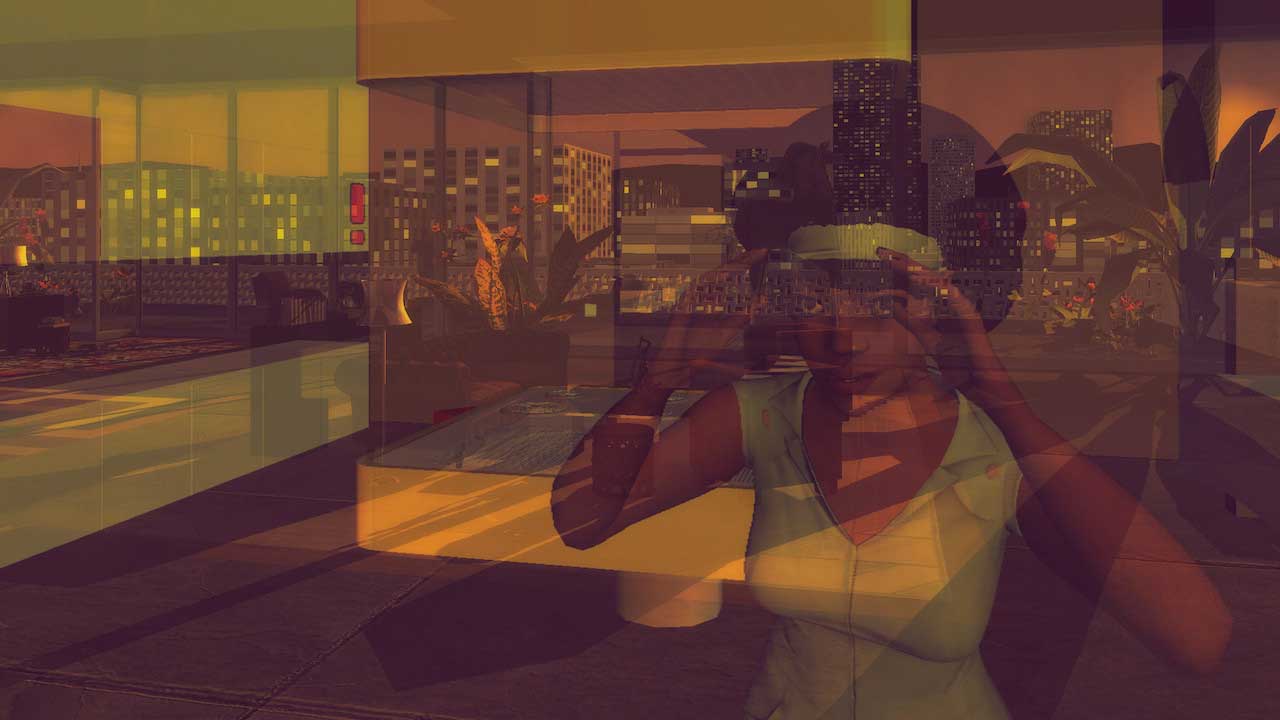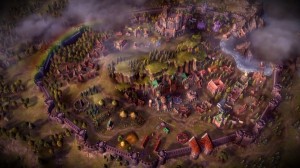While the video games industry continues to grow, the question of what a game truly is becomes a question that more and more people discuss and debate. Many believe that projects like Dear Esther or Gone Home are games that simply offer a different sort of experience than a traditional side scrolling platformer or a modern FPS. While a certain amount of debate still exists between gamers about this topic, it hasn’t stopped indie developers from grasping the opportunity that today’s video game climate has offered them, a chance to tell their story in their way.
Enter studio Tale-of-Tales, and their game Sunset. Run by duo Auriea Harvey and Michaël Samyn out of their home in Belgium, this studio chose to follow through with an idea nearly 10 years in the making after seeing that the video gaming environment might be open to their projects experience. That hope was verified after the couple met their Kickstarter goal early on in the campaign to now reach more than double their original estimate with nearly a week still left on the clock.
Players take on the role of housekeeper Angela Burnes as she discovers the mysterious activity of her client Gabriel Ortega and the role he plays in a rebellious plot to combat the dictatorial government of their fictional South American city.
The two-person team sat down for an exclusive look into how this unique game was conceived, and how developing games as a couple has flavored their work and lives.
Jesse Tannous: In your Kickstarter trailer, you describe the aesthetics and a bit about the historical period you’ve chosen as the backdrop for your game, but I’m interested in why this period resonated with you as game developers?
Auriea Harvey and Michaël Samyn: We were both born around that time. It’s where we came from. The early 1970s also seem like the last era of innocence in the Western world. A time when people could still believe in the possibility of political change, in progress even. As opposed to our current “post-politics” that only treat the symptoms of a problem but never dare to consider the disease. Because that would conflict with our core beliefs in democracy and freedom. Beliefs that seem to have become the dominant ideology in exactly those early seventies.
The conflicts in Latin America that inspire the game are those between local social movements and international interventions. Many democratically elected socialist governments were overthrown in that era with the help of the US government under the guise of their passionate battle against the rise of communism. Back then communism was seen by many in the US as pure evil and the rhetoric is weirdly similar to that which is currently employed against terrorism, not to mention the practice of military intervention and regime change.
At the same time, issues relating to race, gender and class are on the rise. Or maybe they never went away and they are simply becoming visible again.
There’s a lot of parallels between the early seventies and our current times. Sunset is a celebration of the revolutionary spirit of the 1970s which seems to be lacking today. As well as a contemplation on the nature of violence, and its relationship to culture and civilization.
JT: What sort of emotional experiences do you hope players will walk away with from Sunset? What do you hope they will learn?
AH & MS: We have no explicit expectations. We want our games to be frameworks that help people define their positions. By putting the player in the shoes of a Black woman immigrant, we hope they gain a better understanding of what the world looks like from her vantage point. The ultimate goal being to enrich people’s lives by making them more aware of the beautiful variety that exists on this planet. So if there is a message in Sunset, It could be that we should always be prepared to reconsider our opinions, not just out of fairness, but simply out of curiosity.
JT: Your project has already been successfully funded, what sort of strategies did you implement to help make your campaign as successful as possible as quickly as possible?
AH & MS: The most important strategy is probably to stubbornly create these types of videogames for ten years. And then to propose an idea based on all that experience mixed with an assessment of what a larger group of people would appreciate. So there’s not much strategy involved at all. I think people back our project because they believe in us as developers and they like the idea of Sunset.
That being said, we did extensively study other Kickstarter projects and critically gaged our personal reaction to how projects were being presented. On top of that we asked for advice from many people with tons of experience. We didn’t really aim to reach our target so quickly. We had real doubts about reaching it at all and considered the Kickstarter first and foremost as a test to see how people would respond to our idea. Needless to say we’re delighted by what happened next.
JT: Why now for this game? You mention in your Kickstarter that this game has been in your minds since 2005, and you’ve been making games together for the last 10 years, so what made now the right time to get this project going?
AH & MS: We were working on two other projects (The Book of 8 and An Empty World) when we noticed a) how games like Dear Esther and Gone Home were suddenly able to find an audience and ![]() how similar those games were to our own. We remembered this old idea for a first person game and figured we could develop it in such a way that the audience for those games would enjoy it. Sunset was supposed to be a small project that we did on the side of the two mentioned. But because of practical circumstances to do with logistics and funding, we decided to focus on Sunset and come back to the other projects when it was done. So it’s a combination of intention and chance.
how similar those games were to our own. We remembered this old idea for a first person game and figured we could develop it in such a way that the audience for those games would enjoy it. Sunset was supposed to be a small project that we did on the side of the two mentioned. But because of practical circumstances to do with logistics and funding, we decided to focus on Sunset and come back to the other projects when it was done. So it’s a combination of intention and chance.
JT: Have you been a couple for the entire time you’ve been making games together for the last 10 years? How has being a couple affected, helped, or hindered your work as indie game developers?
AH & MS: Yes. Even before we started making games, we collaborated on websites and net.art projects (as Entropy8Zuper!). We even won a prize for that in 2000. We started collaborating the day after we met in a chatroom in hell (the hell.com domain, that is: the home of an online artists collective). We both felt that the other complemented something that was lacking. Apparently both creatively and romantically. It took only a few months for Auriea to move away from New York and come and live in Belgium.
The good thing about being two people whose skills complement each other is that we can make an entire relatively sophisticated videogame on our own. The bad thing is that our relationship is always more important than the work we make. That sometimes leads to strange decisions. We might have been much more successful if we didn’t love each other so much. Although, who would want to trade?
JT: Walk me through your process of game development as a couple. Do you have to both be on board conceptually for a project to work well together on it? Or are compromises made to keep both of you interested?
We have to both believe in the project 100%, though we might have different reasons. Compromise can be acceptable but only really in areas where one of us has a veto. But most of the time either we both like an idea or we don’t do it. A compromise would lead to a game that is only half as good than the original ideas. We try to fuse ideas instead in an attempt to make a game that is twice as good. We try to create room for the other person’s creativity in order to enrich the game.
Despite any current debate about the nature of what makes a game, Tale-of-Tales seem perfectly comfortable with pushing the boundary of artistic expression through video games.
Jesse has been writing video game related articles and interviewing industry professionals for almost 3 years and strives to become a professional nerd.




